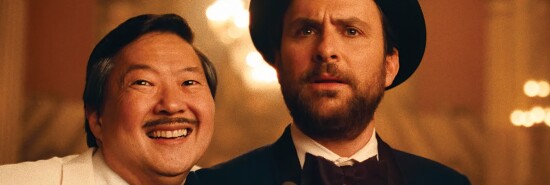
Charlie Kelly is no Little Tramp
Graham Hillard
Is Charlie Day funny? The sitcom writer and star is obviously successful, having anchored the cast of It’s Always Sunny in Philadelphia for 16 squirm-inducing seasons. Yet even that achievement offers little in the way of proof of concept. IASIP, as its frat boy and nihilist fans have come to know it, is a tribute to human depravity in which laughs are an occasional byproduct. (Sample episode title: “The Gang Finds a Dumpster Baby.”) I won’t say the show has never made me smile, but it’s been an expression of astonishment, not pleasure. Perhaps God chuckled as he destroyed Sodom and Gomorrah.
Of course, there’s no accounting for taste, and IASIP has clearly accumulated a loyal audience. The more germane question, then, may be whether devotees to Day’s coal-black humor will thrill to his latest effort, a far broader affair that salutes Charlie Chaplin rather than, say, the Prince of Darkness. That project, the feature-length comedy Fool’s Paradise, enjoyed a brief theatrical release in May and is now available for streaming. Does it bring the laughs? Only sometimes. Nevertheless, it cracks a door through which Day may profitably slip in the future.
POLITICAL INCORRECTNESS IS KILLING COMEDY
Fool’s Paradise begins in a seedy Los Angeles diner, where idiotic publicist Lenny (Ken Jeong) is being fired by his sole remaining client. A veritable fountain of bad advice (“I hear ventriloquism’s making a comeback”), Lenny is nonetheless a skilled wheedler, able to talk his way onto the set of a Billy the Kid biopic mere minutes after his termination. Happily for our titular fool, the production in question is at least as big a mess as he is. Fed up with the antics of actor Tom Bingsley (Day), the film’s producer (Ray Liotta) has replaced his star with an off-the-street look-alike (Day again) who offers none of the usual A-list headaches. When Bingsley dies in an episode involving method acting and a noose, the switch is made permanent. Lenny, sensing a chance to bag a new client, pounces.
If the movie that follows is never quite sure what it wants to be, it is indisputably a chance for its leads to have a good time. As Lenny, the film’s exuberant heart, Jeong brings a deranged glee that stays (mostly) on the right side of the funny-obnoxious divide. Day, meanwhile, is amusingly hammy as Bingsley, a profane and drunken Englishman trying far too hard to channel an American icon. Had Day, who also wrote and directed the film, desired a safe first foray into moviemaking, he might have stopped there, allowing the interplay of these cleverly drawn antiheroes to dominate the proceedings. Instead, the rookie auteur has set himself the harder task of conjuring silent-era magic while sending up Tinseltown excess. The resulting creation is one of the strangest protagonists to inhabit the screen in years.
That character, the aforementioned film star look-alike, is the ridiculously named Latte Pronto, played by Day himself. Like the Little Tramp, he is a mute man-child suffering from age regression. Pronto starts the movie in a mental institution and ends it as a decorated performer with an ex-wife and kids — all without uttering a word. Given the actors’ strike, one is tempted to read him as a poke at industry management: of course a silent and compliant leading man does well in Hollywood. But the film’s targets appear to be elsewhere. Plucked from anonymity, Pronto acquires a retinue of hangers-on with distressing speed. Later, critics take a blow when Pronto’s habit of looking directly into the camera lens is reframed as a courageous assault on the fourth wall.
Who doesn’t enjoy a good showbiz satire? The problem, common to most movies with a large cast not directed by Robert Altman, is that there is simply too much going on in Fool’s Paradise for the story to cohere in any meaningful way. Between Kate Beckinsale as Pronto’s bubbleheaded wife, Adrien Brody as his faux-mystic co-star, and John Malkovich as, well, I’m not entirely certain, Day’s movie pursues more rabbit trails than Lassie. To be sure, some of these digressions work, chief among them Jason Sudeikis’s turn as a hilariously self-involved director. Yet the prevailing tone achieved by Day and company is one of slapdash freneticism. By the time the rapper Common shows up as a homeless former action star, audiences will be reaching for the remote. How much time does this thing have left in it, anyway?
To say that this episodic zaniness sits uneasily alongside Day’s Chaplinesque mugging may be the moviegoing understatement of the year. Hollywood absurdity as observed by a mental five-year-old might have made a successful comedy. So might the character-actor carousel that Fool’s Paradise plainly delights in riding, led by Jeong’s winning work. Put them together, however, and one gets a movie that doesn’t make sense, that frequently wastes time, and that could have been far funnier. Day can write a scene, but he desperately needs someone to tell him “no.”
CLICK HERE TO READ MORE FROM THE WASHINGTON EXAMINER
Graham Hillard is a Washington Examiner magazine contributing writer and editor at the James G. Martin Center for Academic Renewal.
